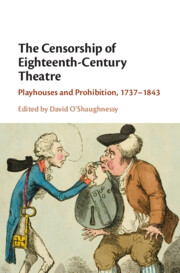Book contents
- The Censorship of Eighteenth-Century Theatre
- The Censorship of Eighteenth-Century Theatre
- Copyright page
- Dedication
- Contents
- Figures
- Contributors
- Acknowledgements
- Abbreviations
- Introduction
- Part I Gender
- Chapter 1 Censorship as Cultural Production
- Chapter 2 Damned Women, or the Disclosures of Censorship
- Chapter 3 Women Writers and Censorship in the Early Nineteenth Century
- Part II Politics
- Part III Performance
- Bibliography
- Index
Chapter 2 - Damned Women, or the Disclosures of Censorship
from Part I - Gender
Published online by Cambridge University Press: 03 August 2023
- The Censorship of Eighteenth-Century Theatre
- The Censorship of Eighteenth-Century Theatre
- Copyright page
- Dedication
- Contents
- Figures
- Contributors
- Acknowledgements
- Abbreviations
- Introduction
- Part I Gender
- Chapter 1 Censorship as Cultural Production
- Chapter 2 Damned Women, or the Disclosures of Censorship
- Chapter 3 Women Writers and Censorship in the Early Nineteenth Century
- Part II Politics
- Part III Performance
- Bibliography
- Index
Summary
This essay examines theatrical damnation as a mode of censorship and how it proved to be a particularly fraught experience for women playwrights. The argument unfolds in two sections. The first section looks at how and why audiences shouted Hannah Cowley’s The World as it Goes (1781) off the stage after two performances. The damnation of such a successful playwright, in many ways at the height of her powers and popularity, discloses a great deal about what kinds of satirical commentary were viable for women writers at this historical moment. The play’s re-presentation, equally doomed, as Second Thoughts are Best, allows us to speculate on how class and gender converge in this scenario to produce the unproduceable. The second section focuses on the damnation of a far less accomplished playwright. Lady Eglantine Wallace’s comedy The Ton (1788) generated increasing levels of disapprobation over its four nights. In this case however the press played a crucial role in the censorship because it closely aligned Lady Wallace’s moral culpability with the play’s aesthetic shortcomings. The outrage was directed at elite sociability and thus it also offers a useful counterexample to Cowley’s excoriation of the middling ranks. Finally, the argument offers a snapshot of how the repertoire itself was changing over the 1780s.
Keywords
- Type
- Chapter
- Information
- The Censorship of Eighteenth-Century TheatrePlayhouses and Prohibition, 1737–1843, pp. 52 - 72Publisher: Cambridge University PressPrint publication year: 2023



